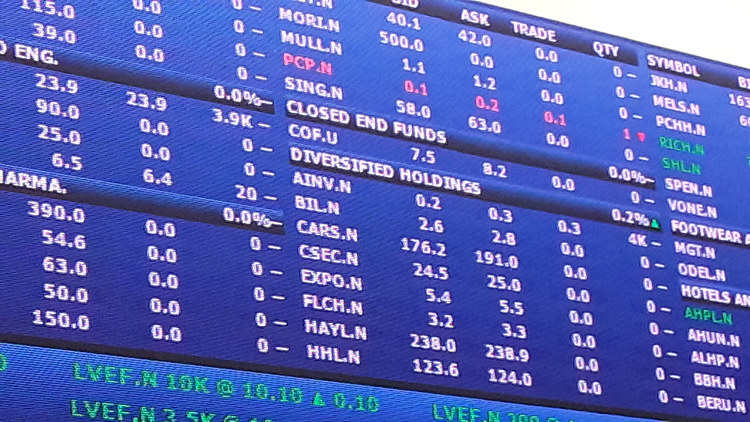May, 19, 2019

Reuters - Sri Lankan shares closed higher for a second straight session on Friday, moving further away from a near seven-year closing low hit earlier this week, as local investors bought beaten down stocks. ** Traders, however, said sectarian violence still weighed on investor sentiment. Most investors have shied away from the market since the April 21 bombings that killed more than 250 people. ** The International Monetary Fund (IMF) on Tuesday approved the disbursal of a $164 million tranche of a loan programme, bringing the total disbursed to more than $1.16 billion. ** Sri Lanka’s economy should still grow 3.5% this year and there has not been a revision yet, the IMF added on Thursday. ** Sri Lanka’s economic growth is expected to slump to its lowest in nearly two decades this year, a Reuters poll showed last week. Tourism, foreign investment and overall business activity have all dropped after the bombings. ** The benchmark stock index ended 0.15% firmer on Friday at 5,259.71. It fell 1.28% this week. ** Turnover was 1.4 billion rupees ($7.97 million), more than this year’s daily average of around 565.2 million rupees. Last year’s daily average was 834 million rupees. ** Foreign investors sold a net 997.3 million rupees worth of shares on Friday, extending the year-to-date net foreign outflow to 5.7 billion rupees worth of equities. ** The rupee ended steady at 175.90/176.10 per dollar in dull trade, market sources said. ** Analysts expect the currency to weaken as money flows out of stocks and government securities. ** The rupee gained 0.1% this week and is up 3.9% for the year. Exporters had converted dollars as investor confidence stabilised after a $1 billion sovereign bond was repaid in mid-January. ** The rupee dropped 16% in 2018 and was one of the worst-performing currencies in Asia. ** Foreign investors sold a net 10.8 billion rupees worth of government securities in the week ended May 8, extending net foreign outflow to 20.8 billion rupees so far this year, central bank data showed. ** Investor sentiment was damaged at the end of last year when President Maithripala Sirisena abruptly removed Prime Minister Ranil Wickremesinghe and then dissolved parliament. A court later ruled the move unconstitutional, but the political turmoil led to credit rating downgrades and an outflow of foreign funds.
Video Story